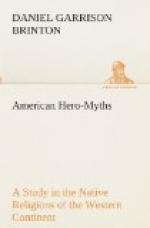The diversity and intricacy of American mythology have been greatly fostered by the delight the more developed nations took in rhetorical figures, in metaphor and simile, and in expressions of amplification and hyperbole. Those who imagine that there was a poverty of resources in these languages, or that their concrete form hemmed in the mind from the study of the abstract, speak without knowledge. One has but to look at the inexhaustible synonymy of the Aztec, as it is set forth by Olmos or Sahagun, or at its power to render correctly the refinements of scholastic theology, to see how wide of the fact is any such opinion. And what is true of the Aztec, is not less so of the Qquichua and other tongues.
I will give an example, where the English language itself falls short of the nicety of the Qquichua in handling a metaphysical tenet. Cay in Qquichua expresses the real being of things, the essentia; as, runap caynin, the being of the human race, humanity in the abstract; but to convey the idea of actual being, the existentia as united to the essentia, we must add the prefix cascan, and thus have runap-cascan-caynin, which strictly means “the essence of being in general, as existent in humanity."[1] I doubt if the dialect of German metaphysics itself, after all its elaboration, could produce in equal compass a term for this conception. In Qquichua, moreover, there is nothing strained and nothing foreign in this example; it is perfectly pure, and in thorough accord with the genius of the tongue.
[Footnote 1: “El ser existente de hombre, que es el modo de estar el primer ser que es la essentia que en Dios y los Angeles y el hombre es modo personal.” Diego Gonzalez Holguin, Vocabvlario de la Lengva Qqichua, o del Inca; sub voce, Cay. (Ciudad de los Reyes, 1608.)]
I take some pains to impress this fact, for it is an important one in estimating the religious ideas of the race. We must not think we have grounds for skepticism if we occasionally come across some that astonish us by their subtlety. Such are quite in keeping with the psychology and languages of the race we are studying.
Yet, throughout America, as in most other parts of the world, the teaching of religious tenets was twofold, the one popular, the other for the initiated, an esoteric and an exoteric doctrine. A difference in dialect was assiduously cultivated, a sort of “sacred language” being employed to conceal while it conveyed the mysteries of faith. Some linguists think that these dialects are archaic forms of the language, the memory of which was retained in ceremonial observances; others maintain that they were simply affectations of expression, and form a sort of slang, based on the every day language, and current among the initiated. I am inclined to the latter as the correct opinion, in many cases.
Whichever it was, such a sacred dialect is found in almost all tribes. There are fragments of it from the cultivated races of Mexico, Yucatan and Peru; and at the other end of the scale we may instance the Guaymis, of Darien, naked savages, but whose “chiefs of the law,” we are told, taught “the doctrines of their religion in a peculiar idiom, invented for the purpose, and very different from the common language."[1]




